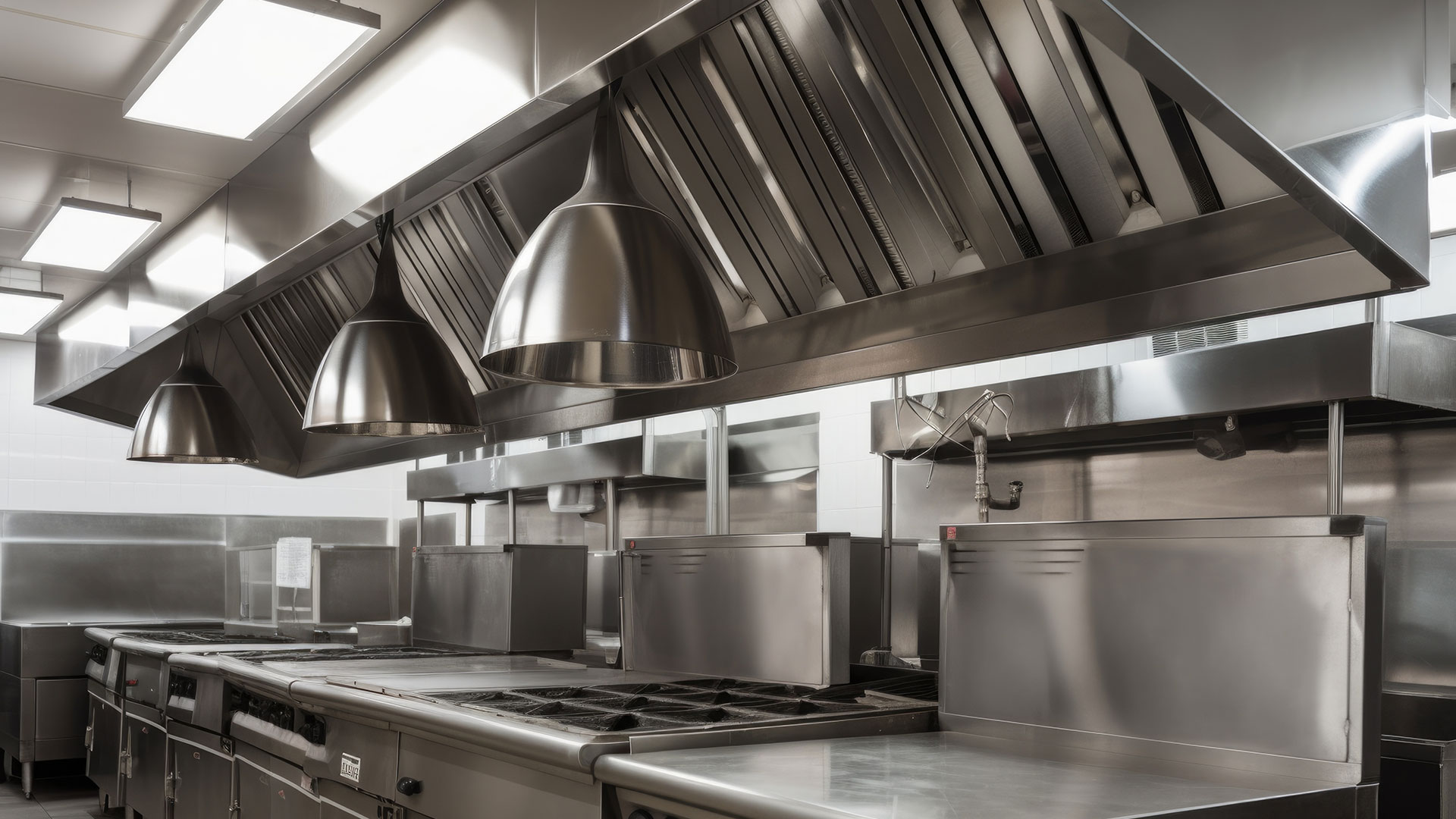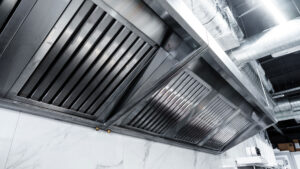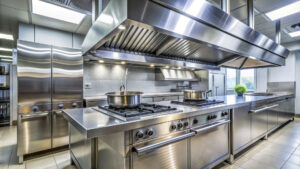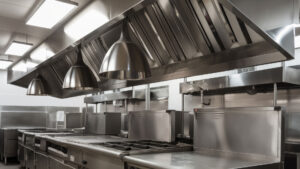Did you know that all commercial appliances under a Type I hood must have an approved automatic fire suppression system? This is according to the International Building Code and International Fire Code. It shows how important it is to follow hood cleaning rules for safety and efficiency in commercial cooking.
NFPA 96 guidelines are the top rules for these practices. They give detailed methods and how often to clean important parts like exhaust ductwork and fans. They also cover hood undersides, filters, and plenum areas.
The National Fire Protection Association’s NFPA 96 “Standard for Ventilation Control and Fire Protection of Commercial Cooking Operations” is key. It sets the main rules for keeping kitchen exhaust systems safe. The rules can change based on how much and what kind of cooking is done.
For example, systems for solid fuel cooking need a check and clean every month. But, places like churches with low-volume systems might only need a yearly check.
Knowing these codes and standards is very important for anyone in commercial cooking. It’s not just about following rules. It’s also about keeping people and property safe from dangers like grease-laden vapors and other flammable materials.
Key Takeaways
- The International Building Code and International Fire Code mandate automatic fire suppression systems for all commercial appliances under a Type I hood.
- NFPA 96 guidelines specify the cleaning frequency requirements based on the volume and type of cooking operations.
- Type I hoods must be installed at least 18 inches away from combustible materials and must adhere to strict material thickness requirements.
- Regular maintenance, including thorough cleaning of sealed joints and grease gutters, is crucial to prevent contamination and ensure safe operations.
- Proper training and certification are required for companies conducting hood cleaning, as per Section 11.4 of the NFPA 96 standard.
Understanding Hood Cleaning Codes and Standards
Keeping your commercial kitchen safe is key. Following the kitchen exhaust cleaning code helps prevent fires and ensures good air flow. NFPA 96 is a major guideline for cleaning frequencies and methods based on cooking types. These hood cleaning standards keep systems running well and safely.
According to NFPA 96, systems for solid fuel cooking need monthly checks. High-volume cooking spots, like those open 24/7 with charbroiling or wok cooking, should be checked every three months. Places with moderate cooking, like restaurants, need checks every six months. Low-volume spots, like churches, should be checked once a year.
Regular checks are vital to stop grease buildup, which can catch fire easily. The U.S. Fire Administration found that cooking caused 63.5% of restaurant fires from 2011 to 2013. Many of these fires were due to dirty kitchen exhaust systems, showing how important it is to follow cleaning standards.
NFPA 96 also has rules for different cooking types to fight grease buildup:
- Systems serving solid fuel cooking operations: Monthly
- Systems serving high-volume cooking operations (24-hour cooking, charbroiling, wok cooking): Quarterly
- Systems serving moderate-volume cooking operations: Semi-Annually
- Systems serving low-volume cooking operations (churches, day camps, seasonal businesses): Annually
Table 11.4 of NFPA 96 gives detailed guidance on these rules. Sections 11.6.1 and 11.6.2 also say that dirty parts must be cleaned by experts. This ensures hoods, grease removal devices, fans, and ducts are kept clean to avoid too much contamination.
Following NFPA 96 guidelines keeps your kitchen safe and your systems working well. It’s important to hire qualified professionals for these jobs. Cheap cleaning services might miss important spots, risking safety and cleanliness. Sticking to the kitchen exhaust cleaning code is about keeping everyone safe and healthy in the kitchen.
Implementation of Hood Cleaning Practices
Keeping commercial kitchens safe is key, and hood cleaning plays a big role. Every year, about 5,600 restaurant fires happen in the U.S., many caused by cooking equipment and grease buildup. So, following hood cleaning codes and standards is crucial.
The NFPA 96 code requires the kitchen exhaust system to be cleaned to bare metal. Professional cleaners use high-pressure washing to remove grease. This method is effective and safe.
Certified technicians, like those from the International Kitchen Exhaust Cleaning Association (IKECA), follow strict hood cleaning certification rules. They check and clean every part, including hidden spots where grease can build up.
The frequency of commercial kitchen hood maintenance depends on the cooking type and volume:
- Monthly cleanings for kitchens using solid fuels, such as wood or charcoal.
- Quarterly for high-volume operations without solid fuel, typical of most restaurants.
- Semi-annually for moderate volume cooking establishments.
- Annually for low-volume kitchens such as those in churches or seasonal businesses.
It’s also important to have high-efficiency grease filters or approved grease removal devices. These must meet standards like UL 1046 and be kept at least 18 inches away from cooking surfaces for safety.
Regular maintenance not only keeps kitchens safe but also improves airflow and reduces fire risks. It also prevents slips and falls caused by grease. Keeping maintenance records helps stay compliant with fire safety codes and boosts kitchen efficiency.
Conclusion
It’s important to know and follow the cleaning hood vent code and hood cleaning rules. This ensures safety, meets regulations, and keeps commercial kitchens running well. Following NFPA 96 guidelines helps avoid fires and keeps the air clean.
To stop grease fires, there are specific rules for hoods, clearances, and airflow. These rules help keep kitchens safe and efficient.
Keeping up with maintenance and following the cleaning code is key. Kitchens that cook a lot should clean their hoods every 3 months. Places that cook less often need to clean every 6 or 12 months.
For kitchens with charcoal or wood stoves, or those open 24/7, cleaning monthly is a must. Staying on schedule helps avoid problems, saves energy, and cuts costs.
It’s also important to keep records of cleaning work. This includes dates, who did the cleaning, and what was done. This is for local fire codes and inspections.
Keeping good records helps with compliance and makes kitchen systems last longer. Following these rules makes kitchens safer and more efficient. It also lowers costs and risks, helping food service places run smoothly.



